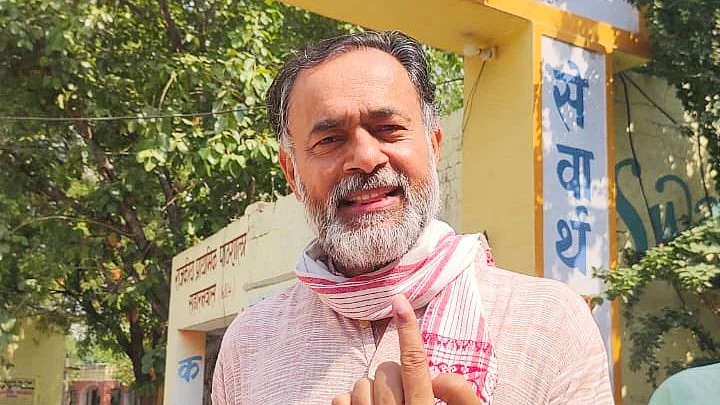Drop our names from textbooks or see you in court: Palshikar, Yogendra to NCERT
Sweeping changes in textbooks without consulting them unethical and unacceptable, say social scientists in joint letter to NCERT director

If textbook lessons on riots can create violent citizens, shouldn’t textbooks then make no mention of wars? Or events such as the nuclear attack on Hiroshima and Nagasaki? Does the NCERT (National Council of Educational Research and Training) director realise the difference between eulogising political violence and condemning it and learn the right lessons?
This was one of the scores of questions thrown at NCERT director Dinesh Prasad Saklani, who denied the charge of air brushing textbooks, dropping references that make the Sangh Parivar and the BJP-led Union government uncomfortable, and adding ones that tend to gloss over their omissions and commissions.
The controversy over the textbooks erupted once again on Monday following a Times of India report, in which Saklani is quoted as saying there was no need to teach students about riots, specifically the Gujarat riots of 2002. The revised political science textbooks prescribed for classes 11 and 12, however, mention vote-bank politics and minority appeasement, tropes borrowed from the Sangh Parivar.
The textbooks have also dropped a table containing achievements credited to Mughal emperors, the Somnath-Ayodhya Rath Yatra, and the BJP’s expressions of regret over the demolition of the Babri Masjid at Ayodhya. Indeed, the textbook refers to the mosque as a ‘three-domed structure’ and makes copious references to the Supreme Court’s Ayodhya judgment allowing construction of the Ram temple.
Political scientist Suhas Palshikar sarcastically said, “Using the SC verdict is a great 'academic' idea for distorting political history, but didn't the SC verdict in the Ayodhya case also specifically say that vandalising the mosque was a criminal act? How about mentioning this in the textbook?”
Both Palshikar and Yogendra Yadav, who acted as advisors when the textbooks were first finalised in 2005-06, wrote to the NCERT on Monday, demanding their names be dropped from the textbooks or else they would be forced to take the NCERT to court.
Yadav revealed that they had asked for their names to be dropped last year too, but the NCERT had then reiterated their copyright over the textbooks and argued that the textbooks were the result of collective effort, so the views of a few did not count.
“Is it not better that the NCERT withdraw the textbooks it disagrees with?” asked Palshikar on Monday, pointing out that the newly discovered 'scholars', who have remained anonymous, have a fundamentally different take on secularism, and so the honest way would be to withdraw older textbooks and write new ones with new names as advisors and authors.
“Why would the country's premier textbook development body hide its academic misconceptions behind the likes of Yogendra Yadav and Suhas Palshikar and all other authors who have earlier asked for removal of their names? NCERT doesn't seem to have confidence in the 'scholars' whom it has discovered now to mutilate earlier textbooks,” Palshikar said.
He also pointed out that the violence used to destroy the Babri Masjid was not mere violence. It was the weaponising of a historical dispute to advance the politics of majoritarianism. Similarly, he argued, Godhra and post-Godhra violence was an instance of the dangers of majoritarian politics. The introduction of this in textbooks is a necessary factor while talking of politics in India.
“In any case, it's bizarre that NCERT should retain names of advisors and authors whose writing and approach it disagrees with,” Palshikar posted on X.
In a letter addressed to Saklani on Monday, Yadav and Palshikar said they were “shocked to discover” that more than a year after they publicly disassociated themselves from the textbooks in their current form and requested Saklani to remove their names, NCERT had reprinted the textbooks with further revisions while identifying the two as chief advisors.
“Besides the earlier practice of selective deletions, the NCERT has resorted to significant additions and rewriting that are out of sync with the spirit of the original textbooks… The NCERT has no moral or legal right to distort these textbooks without consulting any of us and yet publish these under our names despite our explicit refusal. There can be arguments and debates about someone’s claims to authorship of any given work. But it is bizarre that authors and editors are forced to associate their names with a work they no longer identify as their own,” the letter states.
“Both of us do not want the NCERT to hide behind our names to pass on to students such textbooks of political science that we find politically biased, academically indefensible and pedagogically dysfunctional… The new editions of these books that have been published with our names should be withdrawn from the market forthwith… If the NCERT fails to take immediate corrective action, we may be forced to take legal recourse,” the letter adds.
Follow us on: Facebook, Twitter, Google News, Instagram
Join our official telegram channel (@nationalherald) and stay updated with the latest headlines
